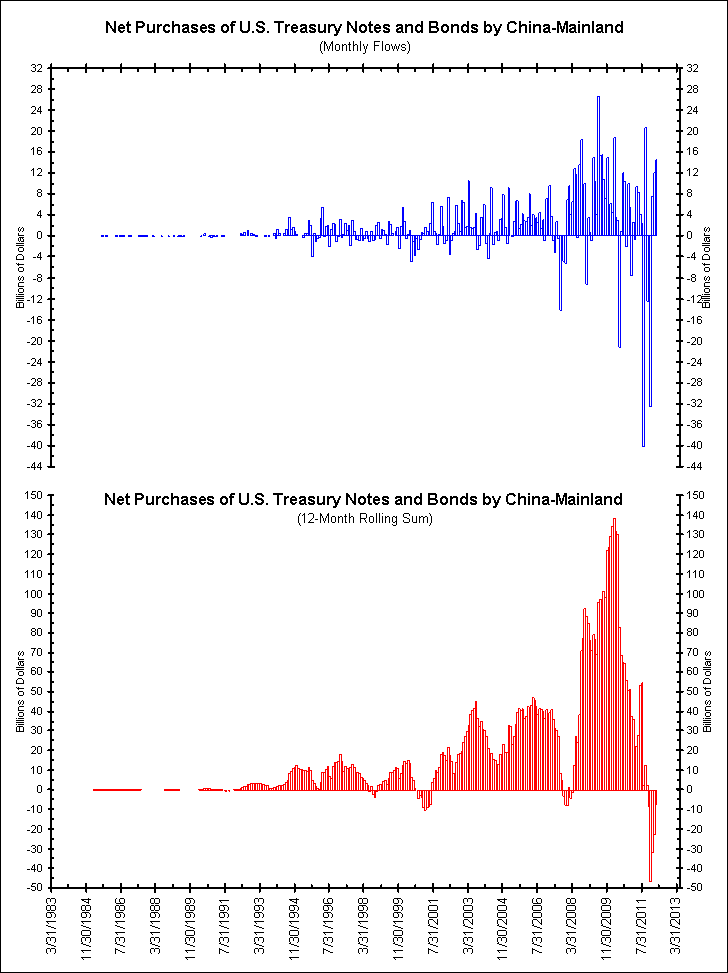古风无痕
世界的政经大势;人生的欢喜怒骂;精神的上下求索。【古风按】最近(2012年5月21日),西方主流传媒路透社爆出了一条令人震惊的消息(见下面附录的英文资料):美国财政部已经在去年的六月份赋予了中国央行(人民银行)直接购卖美国国债的资格。大家可不要小看这个举措哟,这其中仅仅从字面上看就有三点极其重要的资讯:①只有原始交易商(primary dealer)才有这种直接购卖美国国债的资格,而此资格以前一直被为数不多的超级大银行(也就是国际金融资本的嫡系部队)所垄断。②原始交易商的地位本身除了拥有美国的国债发行政策的直接知情权(甚至还能直接参与政策的咨询、制定、修订)外,还有巨大的商业利益,因为原始交易商从美国财政部直接购买到美国国债后,即便不收取任何手续费,也仍然可以再用较高的价格转手卖给其他的买家(包括美联储自己喔),只要现行美元体系不倒,这就是保赚不赔的买卖!③中国央行现在是历史上唯一一家享有这种待遇的国家央行,连美国自己的央行——美联储都没有这个资格咧,更不消说其他国家(如日本)的央行了。
由于这折消息仅仅显示出中国能够直接购买美国国债的讯息,而并没有很细致地讨论中国抛售美国国债的课题,许多爱国的网友读完消息后都在破口大骂中国政府的所谓卖国行径。当然,爱国人士的担忧是完全可以理解的,因为美国的7年国债利率现在已经在1%上下了(30年国债利率也降到了3%以下了),如果再把美元的贬值考虑进去,美国国债的实际利率早就是负值了。中国把自己的外汇储备拿去买美国的国债,仅仅从利率的角度去考察的确是笔亏本的买卖。可是在下最后的定论前,在这里面有几处很诡秘的疑点需要大家来进一步地思索:①如果中国买美国的国债肯定亏本,那么中国刚刚获得的原始交易商资格能够消除中间商的多重克扣,是否能够做到少赔了呢?(答案是肯定的吧)②如果中国用较低的“原厂批发价”买进美国国债再转手以较高的价格卖出,是否能够多赚点钱了呢?(答案当然是肯定的嘛)③如果中国的最高领导层都已经被国际金融资本所收买而在大搞卖国行径,为何早已被美国军事占领和被国际金融资本控制的日本没有获得原始交易商的待遇呢?难道日本政府还不够卖国吗?(答案很显然是否定的啦)④如果中国作为美国国债的买家展现出旺盛的持续购买热度,请问作为卖方的美国会自愿给与中国如此优惠吗?当然作为留住大客户的VIP待遇的确在商场上经常遇到,可是为何美国仅仅给中国唯一的VIP待遇,而把同样热情的大客户日本抛在了一边呢?(答案自然是否定的)⑤既然持续的买进不会获得VIP待遇,那么中国是否在抛售美国国债而迫使美国发出史上绝无仅有的VIP卡了呢?(答案只能是肯定的了)
通过上面的层层逻辑推演,我们就能得出一个很明显的结论:中国政府不仅没有卖国、没有被国际金融资本所控制,而且正在为中国的国家利益努力奋斗!那么有什么证据表明中国在抛售美国国债呢?变现出来的钱又都到哪里去了呢?答案就在下面的四篇古风旧作和附录的英文资料里面,请诸位读者继续阅读:
古风解读中国所持美债额度为何下降
http://blog.wenxuecity.com/myblog/46947/201204/8543.html
古风解说法国总统大选后效应及其避险要略
http://blog.wenxuecity.com/myblog/46947/201205/5517.html
关于投资理财的《古风八条》
http://blog.wenxuecity.com/myblog/46947/201205/6412.html
古风解读摩根大通巨亏20亿美元交易的内幕
http://blog.wenxuecity.com/myblog/46947/201205/13383.html
http://azizonomics.com/2012/05/23/is-china-really-liquidating-treasuries/
Is China Really Liquidating Treasuries?
by John Azis, Azizonomics, 23 May 2012
The news that China has become the first sovereign to establish a direct sales relationship with the U.S. Treasury (therefore cutting out the middleman and bypassing Wall Street) raises a few interesting questions.
From Reuters:
China can now bypass Wall Street when buying U.S. government debt and go straight to the U.S. Treasury, in what is the Treasury’s first-ever direct relationship with a foreign government, according to documents viewed by Reuters.
The relationship means the People’s Bank of China buys U.S. debt using a different method than any other central bank in the world.
The other central banks, including the Bank of Japan, which has a large appetite for Treasuries, place orders for U.S. debt with major Wall Street banks designated by the government as primary dealers. Those dealers then bid on their behalf at Treasury auctions.
China, which holds $1.17 trillion in U.S. Treasuries, still buys some Treasuries through primary dealers, but since June 2011, that route hasn’t been necessary.
The documents viewed by Reuters show the U.S. Treasury Department has given the People’s Bank of China a direct computer link to its auction system, which the Chinese first used to buy two-year notes in late June 2011.
The biggest Chinese outflows in U.S. Treasuries occurred in the months following the establishment of this relationship:
Which begs the question for some analysts — was China really selling? Or was China stealthily buying direct from the U.S. Treasury (unrecorded) and selling back into Wall Street (recorded)?
Well, according to the Treasury, the Treasury International Capital data seeks to record foreign holdings of U.S. securities, not just the flows, and given that the Treasury was the seller in these direct transactions (and so obviously was aware of them) there’s no reason to believe that they wouldn’t include any such direct outflows in the data. That suggests very strongly that yes, China really was selling.
And maybe the real reason that the Treasury offered China direct access (thus cutting out the middleman and offering China cheaper access than ever) was precisely because China was selling, and because the Treasury was concerned about the effect on rates, and wanted to give China some incentive to keep buying. As Jon Huntsman noted in a 2010 cable leaked by Wikileaks, the PBOC has felt pressured to keep buying, and as various PBOC officials have hinted in recent months, China is actively seeking to convert out of treasuries and into gold. And that makes sense — treasuries are yielding ever deeper negative real rates. People holding treasuries are losing their purchasing power. No wonder the treasury is willing to cut Wall Street out of the deal.
And it isn’t like the Treasury would have taken this move lightly — cutting Wall Street out of the equation is a slap in the face to Wall Street.
This raises a much more interesting question — now that the PBOC has effectively been upgraded to primary dealer status, would the Fed start buying treasuries directly from the PBOC in order to manage rates downward and prevent a spike in Treasury borrowing costs should China choose to quicken the pace of a future liquidation, potentially bursting the treasury bubble?





